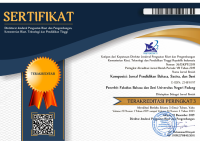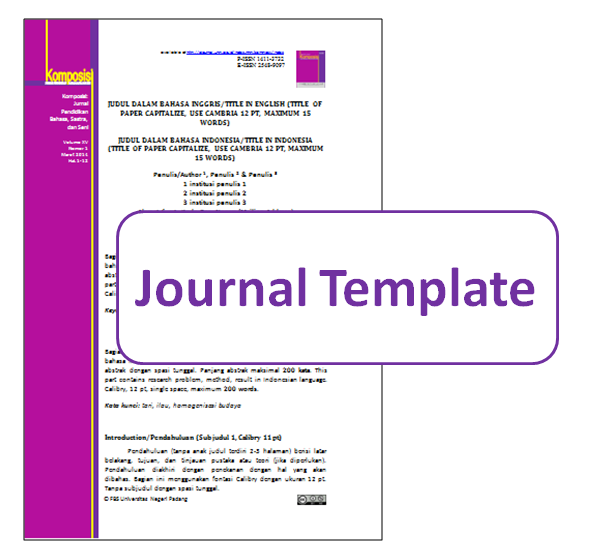Cooperative-Problem Based Learning Model Design in Online Learning
 ), Elfia Sukma(4),
), Elfia Sukma(4), (1) Universitas Negeri Padang
(2) Universitas Negeri Padang
(3) Universitas Negeri Padang
(4) Universitas Negeri Padang
 Corresponding Author
Corresponding Author
Copyright (c) 2023 Komposisi: Jurnal Pendidikan Bahasa, Sastra, dan Seni
DOI : https://doi.org/10.24036/komposisi.v24i2.123466
Full Text:
 Language : en
Language : en
Abstract
At this time, online learning is commonplace, although there are still limitations. Needs analysis reveals that individual learning predominates and that cooperative learning is difficult to implement, despite its significance. Based on this, the purpose of this research is to develop a Cooperative-Problem Based Learning model to be used as a distance learning model in learning Indonesian for high school students. This type of research uses the Plomp Model for development (preliminary research; prototype stage; and assessment stage). This study uses a descriptive data analysis approach. The data was obtained based on the validation results that have been carried out in 2 ways, namely self-evaluation and expert validation. Validation was carried out using instruments in the form of a questionnaire and the results of the questionnaire analysis were analyzed using descriptive statistics. The results showed that the teaching materials produced were classified as very valid and could be tested on students. The results of the study show that a language learning model is needed that allows students to learn cooperatively in groups even when distance or online learning is used. In addition, the learning model must adapt to the demands of students and develop following the progress of science and technology. A possible alternative is the Cooperative-Problem-Based Learning approach.
Keywords
References
Afinda, B. N., Aisyah, R. S. S., & Wijayanti, I. E. (2019). Student team achievement division (STAD) dengan word square: Dampaknya terhadap motivasi dan hasil belajar. JIPVA (Jurnal Pendidikan IPA Veteran), 3(1), 17—27.
Al-Fikry, I., Yusrizal, Y., & Syukri, M. (2018). Pengaruh model Problem Based Learning terhadap kemampuan berpikir kritis peserta didik pada materi kalor. Jurnal Pendidikan Sains Indonesia, 6(1), 17–23.
Alaloul, W. S., & Qureshi, A. H. (2022). Cooperative problem-based learning experience and coaching strategies of engineering course. International Journal of Evaluation and Research in Education, 11(2), 848–861. https://doi.org/10.11591/ijere.v11i2.22243
Ali, R., Hukandad, Akhter, A., & Khan, A. (2010). Effect of using problem solving method in teaching mathematics on the achievement of mathematics students. Asian Social Science, 6(2), 66–72.
Alrahlah, A. (2016). How effective the problem-based learning (PBL) in dental education: A critical review. The Saudi Dental Journal, 28, 155–161.
Amin, S., Utaya, S., Bachri, S., Sumarmi, & Susilo, S. (2020). Effect of problem-based learning on critical thinking skills and environmental attitude. Journal for the Education of Gifted, 8(2), 743–755.
Amrullah, K., & Suwarjo, S. (2018). The effectiveness of the cooperative problem-based learning in improving the elementary school students’ critical thinking skills and interpersonal intelligence. Jurnal Prima Edukasia, 6(1), 66–77. https://doi.org/10.21831/jpe.v6i1.11253
Ananda, R. (2017). Peningkatan pembelajaran IPS dengan menggunakan model Koperatif TIPE Studen Team Achievement Division (STAD) Siswa Sekolah Dasar. Jurnal Basicedu, 1(2), 91–100.
Chiablaem, P. (2021). Enhancing english communication skills of Thai University Students through Google Apps for Education (GAFE) in a digital era during Covid-19 Pandemic. Shanlax International Journal of Education, 9(3), 91–98.
Dakabesi, D., & Louise, I. S. Y. (2019). The effectiveness of problem-based learning model to increase the students’ critical thinking skills. Journal of Education and Learning (EduLearn), 13(4), 543–549.
Damopolli, I., & R., R. S. (2019). The effect of STAD learning model and science comics on cognitive students achievement. Journal of Physics: Conference Series, 1—6, 1—6.
Firdaus, F. M., Eahyudi, & Herman, T. (2017). Improving primary students’ mathematical literacy through problem based learning and direct instruction. Educational Research and Review, 12(4), 212–219.
Fogarty, R. (1997). Problem learning & other curiculum models for the multiple intelligences clasroom. Pearson.
Gaith, G. (2003). Effect of Learning Together Model of Cooperative Learning on english as a foreign language reading achievement, academic self esteem, and feeling of school alienation. Bilingual Research Journal, 27(3), 451–474.
Gorghiu, G., Drăghicescu, L. M., Cristea, S., Petrescu, A. M., & Gorghiu, L. M. (2015). Problem-based learning - an efficient learning strategy in the science lessons context. Procedia-Social and Behavioral Sciences, 191, 1865–1870.
Grasas, A., & Ramalhinho, H. (2016). Teaching distribution planning: A problem-based learning approach. International Journal of Logistics Management, 27(2), 377–394.
Gürsul, F., & Keser, H. (2019). The effects of online and face to face problem based learning environments in mathematics education on student’s academic achievement. Procedia Social and Behavioral Sciences, 1, 2817–2824.
Hasanah, U. (2017). Penerapan Model Cooperative Problem Based Learning (CPBL) Terintegrasi Bahan Ajar Untuk Meningkatkan Hasil Belajar Dan Menumbuhkembangkan Karakter Siswa Pada Reaksi Reduksi Dan Oksidasi. Keguruan, 5(1), 110–120. https://jurnal.uisu.ac.id/index.php/Keguruan/article/view/820/715%0Ahttps://jurnal.uisu.ac.id/index.php/Keguruan/article/view/820
Hijriah, E. M., Darmawan, E., & Zamzami, M. R. A. (2018). Enhancing biology students motivation through classroom action research based STAD learning model. Indonesian Journal of Biology Education, 1(1), 9–16.
Jailani, M., & Qudsiyah, U. (2020). Integrasi Problem Based Learning Dengan Model Cooperative Script Untuk Meningkatkan Hasil Belajar Ekonomi Pada Siswa Di SMA Muhammadiyah 1 Palangkaraya. Soedirman Economics Education Journal, 2(1), 55. https://doi.org/10.32424/seej.v2i1.2255
Juliastuti, I. P., Dyah, W. E., & Surini, H. (2019). Peningkatan pemahaman konsep pecahan pembelajaran tema cuaca melalui model cooperative learning tipe STAD dan media origami pada kelas 3A SDN Purwantoro 2 Malang. Jurnal Basicedu, 3(1), 130–135.
Kanthimathi, S., and Raja, B. W. D. (2021). Covid-19: A challenging enigma to global education. Shanlax International Journal of Education, 221–224(9), 3.
Kardoyo, Nurkhin, A., Muhsin, & Pramusinto, H. (2020). Problem-based learning strategy: its impact on students’ critical and creative thinking skills. European Journal of Educational Research, 9(3), 1141—1150.
Lin, F. L. (2017). Impacts of the Problem-based Learning pedagogy on english learners’ reading comprehension, strategy use, and active learning attitudes. Journal of Education and Training Studies, 5(6), 109–125.
Loza, M. (2018). Pendekatan model kooperatif tipe Students Achievement Dividion (STAD) untuk meningkatan motivasi dan prestasi pembelajaran kimia MAN 2 Kota Padang. Orbital: Jurnal Pendidikan Kimia, 1(1), 37–48.
Mohd-Yusof, K., Helmi, S. A., Jamaludin, M.-Z., & Harun, N.-F. (2011). Cooperative Problem-Based Learning (CPBL). IJET, 6(3), 12–20.
Nurlina Mbay, W. O., Anggo, M., & Sani, A. (2017). Efektivitas Model Pembelajaran Kooperatif Tipe Jigsaw dan Model Pembelajaran Problem Based Learning terhadap Kemampuan Berpikir Kritis dan …. Jurnal Pendidikan Matematika, 8(1), 57–66. http://download.garuda.kemdikbud.go.id/article.php?article=1203010&val=7797&title=Efektivitas Model Pembelajaran Kooperatif Tipe Jigsaw Dan Model Pembelajaran Problem Based Learning Terhadap Kemampuan Berpikir Kritis Dan Komunikasi Matematik Siswa Sekolah
Nurulhikmah, A., & Kristin, F. (2019). Improving mathematics achievement and students’ activity at primary level using STAD learning model. Jurnal Pendidikan Progresif, 9(1), 105–112.
Obaya, A., Vargas-Rodríguez, G. I., Lima-Vargas, A. E., & Vargas-Rodríguez, Y. M. (2018). Problem-based learning: How long does pasteurized milk decompose at room temperature? Chemistry Education, 9(2), 99–109.
Othman, H., Salleh, B. M., & Sulaiman, A. (2013). 5 ladders of active learning: An innovative learning steps in PBL process. In & F. A. P. K. M. Yusof, M. Arsat, M. T. Borhan, E. D. Graaff, A. Kolmos (Ed.), PBL across cultures (pp. 245–253). Aalborg University Press.
Ozkara, B. O., & Cakir, H. (2020). Comparison of Collaborative and individual learning in online learning. TOJET: The Turkish Online Journal of Educational Technology, 19(4), 66—74.
Palupi, B. S., Subiyantoro, S., Rukayah, & Triyanto. (2020). The effectiveness of Guided Inquiry Learning (GIL) and Problem-Based Learning (PBL) for explanatory writing skill. International Journal of Instruction, 13(1), 713–730.
Phuumeechanya, N., & Wannapiroon, P. (2004). Design of Problem-Based with scaffolding learning activities in ubiquitous learning environment to develop Problem-Solving skills. Procedia - Soc. Behav. Sci. World Conf. Educ. Sci. - WCES, 116, 4803–4808.
Reynolds, J. M., & Hancock, D. R. (2010). Problem-based learning in a higher education environmental biotechnology course. Innovations in Education and Teaching International, 47(2), 175–186.
Savery, J. R. (2006). Overview of problem-based learning: Definitions and distinctions. Interdisciplinary Journal of Problem-Based Learning, 1(1), 9–20.
Scholkmann, A. (2020). Why don’t we all just do the same? Understanding variation in PBL implementation from the perspective of translation theory. The Interdisciplinary Journal Od Problem Based Learning, 14(2).
Silva, A. B. Da, Bispo, A. C. K. de A. Rodriguez, D. G., & Vasquez, F. I. F. (2018). Problem-based learning: A proposal for structuring PBL and its implications for learning among students in an undergraduate management degree program. Gestao Magazine/ Revista de Gestao, 25(2).
Slavin, R. (2015). Cooperative Learning teori riset dan praktik. Nusa Media.
Surur, M., Degeng, I. N. S., Setyosari, P., & Kuswandi, D. (2020). The effect of Problem-Based Learning strategies and cognitive styles on junior high school students’ problem-solving abilities. International Journal of Instruction, 13(4), 35–48.
Tan, O. S. (2004). Enchancing thingking trough Problem-based Learning Approache. International Perspective.
Tarim, K., & Akdeniz, F. (2008). The effects of cooperative learning on Turkish elementary students’ mathematics achievement and attitude towards mathematics using TAI and STAD methods. Educational Studies in Mathematics, 67(1), 77–91.
Telli, Y. G., & Altun, D. (2020). The coronavirus and the rising of online education. Journal of University Research, 3(1), 25–39.
Tsai, C., & Chiang, Y. (2013). Research trends in problem-based learning (PBL) research in e-learning and online education environments: A review of publications in SSCI-indexed journals from 2004 to 2012. British Journal of Educational Technology, 44(6), 185–191.
Wyk, M. M. van. (2012). The effects of the STAD-Cooperative learning method on student achievement, attitude and motivation in economics education. Journal of Social Sciences, 33(2), 261–270.
Yaduvanshi, S., & Singh, S. (2019). Fostering achievement of low-, average-, and high-achievers students in biology through structured Cooperative Learning (STAD Method). Education Research International, 1–10.
Yusof, K. M., Hassan, S. A. H. S., Jamaludin, M. Z., & Harun, N. F. (2012). Cooperative Problem-based Learning (CPBL): Framework for Integrating Cooperative Learning and Problem-based Learning. Procedia - Social and Behavioral Sciences, 56(October), 223–232. https://doi.org/10.1016/j.sbspro.2012.09.649
 Article Metrics
Article Metrics
 Abstract Views : 274 times
Abstract Views : 274 times
 PDF Downloaded : 68 times
PDF Downloaded : 68 times
Refbacks
- There are currently no refbacks.
Copyright (c) 2023 Komposisi: Jurnal Pendidikan Bahasa, Sastra, dan Seni

This work is licensed under a Creative Commons Attribution-NonCommercial 4.0 International License.











